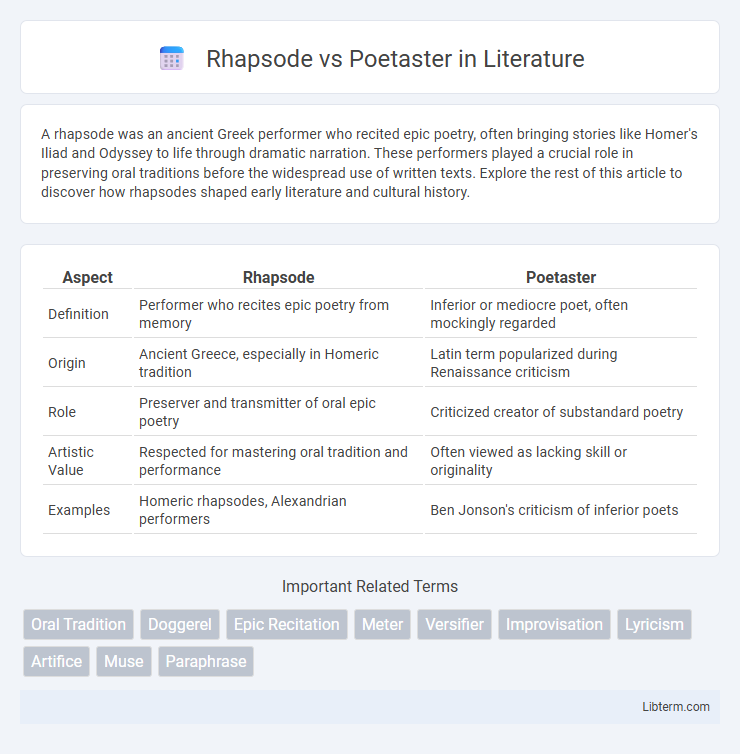A rhapsode was an ancient Greek performer who recited epic poetry, often bringing stories like Homer's Iliad and Odyssey to life through dramatic narration. These performers played a crucial role in preserving oral traditions before the widespread use of written texts. Explore the rest of this article to discover how rhapsodes shaped early literature and cultural history.
Table of Comparison
| Aspect | Rhapsode | Poetaster |
|---|---|---|
| Definition | Performer who recites epic poetry from memory | Inferior or mediocre poet, often mockingly regarded |
| Origin | Ancient Greece, especially in Homeric tradition | Latin term popularized during Renaissance criticism |
| Role | Preserver and transmitter of oral epic poetry | Criticized creator of substandard poetry |
| Artistic Value | Respected for mastering oral tradition and performance | Often viewed as lacking skill or originality |
| Examples | Homeric rhapsodes, Alexandrian performers | Ben Jonson's criticism of inferior poets |
Understanding the Terms: Rhapsode and Poetaster
Rhapsodes were ancient Greek performers who memorized and recited epic poetry, often Homeric epics, playing a crucial role in preserving oral literature. Poetaster refers to an inferior or mediocre poet, typically one whose work lacks artistry and originality, often criticized for poor quality and pretentiousness. Understanding these terms highlights the distinction between respected oral narrators like rhapsodes and the contemptuous label "poetaster" used to demean lesser poets.
Historical Origins of Rhapsodes
Rhapsodes originated in ancient Greece as performers who recited epic poetry, especially works of Homer, from memory during public gatherings and festivals. Unlike poetasters, who were often criticized for mediocre or insincere poetry, rhapsodes were respected for their skilled oral transmission of culturally significant texts. Their historical role was crucial in preserving and popularizing epic narratives before the widespread use of written manuscripts.
The Rise of the Poetaster: A Brief Overview
The rise of the poetaster marked a significant shift in literary culture during the Renaissance, characterized by an increase in amateur poets producing verse with less skill and artistic merit compared to earlier rhapsodes. Poetasters often mimicked classical styles but lacked the depth and originality that defined esteemed poets, leading to a broader democratization of poetic expression. This phenomenon reflected both the expansion of literacy and changing attitudes toward creativity and authorship in early modern Europe.
Key Characteristics: Rhapsode vs Poetaster
Rhapsodes were ancient Greek performers specializing in the oral recitation of epic poetry, known for their skilled delivery, memorization, and ability to engage audiences with traditional heroic narratives. Poetasters, by contrast, were considered inferior poets producing crude, derivative, or amateurish works lacking originality and artistic merit. The key difference lies in the rhapsode's role as an esteemed cultural transmitter versus the poetaster's reputation for poor craftsmanship and literary insignificance.
Roles in Ancient Literature and Society
Rhapsodes were professional performers in ancient Greece who memorized and recited extensive epic poetry, playing a crucial role in preserving oral tradition and educating audiences about mythological and historical narratives. Poetasters, by contrast, were often regarded as inferior or amateur poets whose work lacked originality and skill, reflecting social hierarchies in literary value and cultural influence. The rhapsode's status was tied to their ability to engage public gatherings and religious festivals, reinforcing their importance in both literary culture and social rituals.
Artistic Merit and Critical Reception
Rhapsode performances emphasize oral storytelling and dramatic recitation, showcasing artistic merit through vocal expression and emotional depth, which often garnered acclaim for bringing epic poetry to life. Poetasters, typically characterized by inferior craftsmanship and lacking innovation, faced critical reception marked by disdain and ridicule in literary circles. Critical reception favored rhapsodes for their ability to preserve cultural heritage, while poetasters were dismissed due to perceived artistic mediocrity and lack of originality.
Famous Rhapsodes in Literary History
Famous rhapsodes in literary history include Homeric performers who orally recited epic poetry, such as the Iliad and the Odyssey, preserving ancient Greek cultural heritage. Unlike poetasters who produced inferior or trivial poetry, rhapsodes were esteemed for their skillful and expressive storytelling that captivated audiences. Their role was pivotal in maintaining and transmitting classical narratives before the advent of written literature.
Notorious Poetasters: Examples and Legacy
Notorious poetasters like William McGonagall and Julia A. Moore are infamous for their crude meter, forced rhymes, and lack of thematic depth, making them prime examples of literary ineptitude. Their works, often criticized for a lack of poetic merit, have ironically contributed to the study of poetic failures and the boundaries of artistic expression. The legacy of these poetasters serves as a cautionary tale in literary history, highlighting the fine line between earnest creativity and ineffectual verse.
The Modern Perception of Rhapsodes and Poetasters
The modern perception of rhapsodes centers on their role as skilled oral performers who preserved and transmitted epic poetry, highlighting their importance in the cultural and historical continuity of ancient literature. Poetasters, by contrast, are often viewed as inferior or mediocre poets lacking originality and artistic merit, whose work is typically dismissed or criticized for its poor quality. Contemporary scholars emphasize the rhapsode's contribution to literary tradition and oral storytelling, while the term poetaster serves as a derogatory label for unsuccessful or trivial poetic efforts.
Rhapsode vs Poetaster: Lasting Impact on Literary Tradition
Rhapsodes, as skilled performers of epic poetry in ancient Greece, significantly shaped oral literary traditions and preserved foundational texts like Homer's epics, influencing Western literature's evolution. In contrast, poetasters, often characterized by inferior poetic talent and lack of lasting recognition, contributed minimally to enduring literary heritage and critical acclaim. The rhapsode's role in maintaining and transmitting classical narratives ensured a lasting cultural impact, whereas the poetaster's works rarely transcended their immediate context or achieved historical significance.
Rhapsode Infographic

 libterm.com
libterm.com